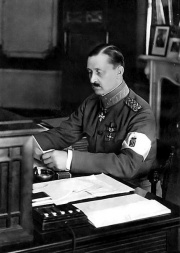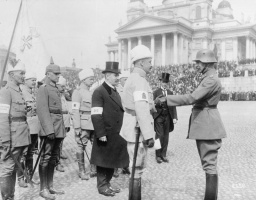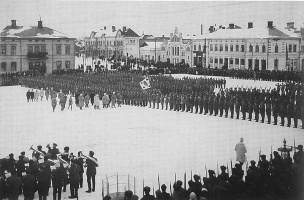Early Years and Entrance to the Imperial Russian Service↑
Friherre (Baron) Carl Gustaf Emil Mannerheim (1867-1951) was born to the Swedish-speaking nobility of the Grand-Duchy of Finland. His father, Count Carl Robert Mannerheim (1835-1914), had left the family after the collapse of his business and fled to Paris with his mistress, leaving the children alone with their mother, Countess Hélène Mannerheim (1842-1881). After the death of his mother, young Gustaf Mannerheim was raised by his maternal uncle, Albert von Julin (1876-1918).
Mannerheim entered the Finnish Cadet School in Hamina at the age of fifteen, but was discharged for disciplinary reasons four years later. He completed his matriculation examination in private lyceum and applied to the Nikolaevskii Cavalry School in St. Petersburg. After serving as a cavalry cornet in a dragoon regiment in Kalisz, he entered the Chevalier Guards in St. Petersburg in 1891, rising to the rank of cavalry captain.
In 1892 Mannerheim married Anastasia Arapova (1872-1936), a wealthy Russian heiress. The couple had two daughters, Anastasie Mannherheim (1893-1977) and Sophie Mannerheim (1895-1963). Mannerheim and his wife separated ten years later, and a formal divorce took place in 1919.
The Early Career in the Russian army↑
Mannerheim received his baptism of fire as a lieutenant colonel in the war against Japan in 1904-1905, commanding irregular Asian mounted troops. After the war, the Russian general staff ordered him on an intelligence expedition to Turkestan, Mongolia, and China in 1906-1907. Mannerheim presented the results of his expedition personally to Emperor Nicholas II, Emperor of Russia (1868-1918).
After his service in the Far East, Mannerheim was given a new post in the Polish provinces of the Russian Empire. He served as the commander of both the 13th Vladimir Uhlan Regiment and the Imperial Life-Guard’s Uhlan Regiment in Mińsk Mazowiecki and Warsaw between 1909 and 1914. During this time, Mannerheim established good relations with the local Polish aristocracy, particularly with Princess Maria Lubomirska ((1873-1934).
Military Service in the First World War↑
Mannerheim began the First World War as a general major, commanding a Russian cavalry brigade in the Carpathians. Participating mainly in hostilities against Austro-Hungarian forces, Mannerheim earned a reputation of fearlessness and contempt of death, and was awarded the Sword of St. George. After the battle of Lublin-Lwów, Mannerheim’s brigade was transferred to Galicia and subordinated to the 8th Army of General Aleksei Brusilov (1853-1926). Brusilov appointed Mannerheim in charge of the 12th Cavalry Division after the previous commander, Lieutenant General Aleksei Kaledin (1861-1918), had been wounded in battle. During the summer of 1916, Mannerheim and his division participated in the Brusilov Offensive.
With the entry of Romania into the First World War, Mannerheim and his division were among the Russian forces dispatched to assist the Romanians. Mannerheim’s troops reached Focsan in December 1916, and he reported to General Alexandru Avarescu (1859-1938), the commander of the 2nd Romanian Army. Mannerheim’s division was reinforced with a Romanian brigade, forming a joint Russo-Romanian force “Group Wrancza” (Vrancea), blocking the entry to the valley of Siret on the Transylvanian Alps. Mannerheim had a high opinion of the bravery of individual Romanian officers and soldiers, but in his memoirs regarded the Romanian entry to the war as a miscalculated distraction, which swallowed up badly needed Russian reserves.
After the Russian withdrawal to Bessarabia, Mannerheim asked for leave to visit Finland. During his furlough, the March Revolution broke out. Although Mannerheim was hostile to the revolution, he remained in service and was promoted to lieutenant general by the Provisional Government. Mannerheim became the commander of the VI Cavalry Army Corps in Odessa. He remained there until September 1917, when the 8th Army dismissed him from active service at his own request, because he was disappointed with the Provisional Government. With the outbreak of the Bolshevik Revolution, Mannerheim decided to leave Russia and return to Finland.
Finnish Civil War and Intervention to Russia↑
Mannerheim arrived in Helsinki in December 1917. The Finnish Senate had issued a Declaration of Independence, but the political situation in the country was heavily polarized between socialists and bourgeois elements. As a distinguished high-ranking officer, Mannerheim was asked to serve as the chairman of the Military Committee, an organization set up by former Finnish cadet officers, which had become an official body of the Finnish Senate. Mannerheim became the chairman on 15 January 1918, and with the subsequent Red Revolution in Helsinki, he became the commander-in-chief of the White forces of the Senate in the Finnish Civil War.
After the Civil War ended, Mannerheim resigned from his post because of the German intervention in the Finnish Civil War and his animosity towards the Central Powers. After the defeat of Germany, his pro-Entente credentials facilitated his return to politics. The Finnish Parliament appointed Mannerheim as the Head of State on 12 December 1918. Mannerheim ratified the new republican constitution and advocated Finnish involvement in the intervention against the Bolsheviks. His desire to support the offensive of General Nikolai Yudenich's (1862-1933) White forces against Petrograd met with political resistance, and was partly responsible for his defeat in the first Finnish presidential elections in 1919. Mannerheim continued to agitate for the Petrograd operation, writing an open letter to President Kaarlo Juho Ståhlberg (1865-1952), meeting with Marshal Józef Piłsudski (1867-1935) in Warsaw and contacting Winston Churchill (1874-1965) in London.
The Later Years↑
During the interwar era, Mannerheim remained in civilian life, serving as chairman of the Finnish Red Cross. He was promoted to Field Marshal in 1933, and appointed as the chairman of the Defence Committee. He served as the commander-in-chief of the Finnish Armed Forces in the Winter War against the Soviet Union in 1939-1940, and again in the Continuation War of 1941-1944. He became the Marshal of Finland in 1942. After the armistice with the USSR, he served as the President of Finland in 1944-1946. He retired for health reasons and settled in Switzerland, where he died in 1951. During the last three years of his life, he wrote his memoirs. Aimed both at the international and at the domestic audience, his memoirs sought to portray Finland as a western nation that had earned her independence in three wars.
Jussi Jalonen, University of Tampere
Section Editor: Piotr Szlanta
Selected Bibliography
- Jägerskiöld, Stig Axel Fridolf: Gustaf Mannerheim, 1906-1917, Helsinki 1965: Otava.
- Mannerheim, Carl Gustaf Emil: Across Asia from West to East in 1906-1908, Helsinki 2008: Otava Finno-Ugrian Society.
- Mannerheim, Carl Gustaf Emil: The memoirs of Marshal Mannerheim, London 1953: Cassell.
- Meri, Veijo: C. G. Mannerheim. Suomen marsalkka (C. G. Mannerheim. Marshal of Finland), Porvoo 1988: W. Söderström.
- Screen, John Ernest Oliver: Mannerheim. The years of preparation, London 1970: C. Hurst.










